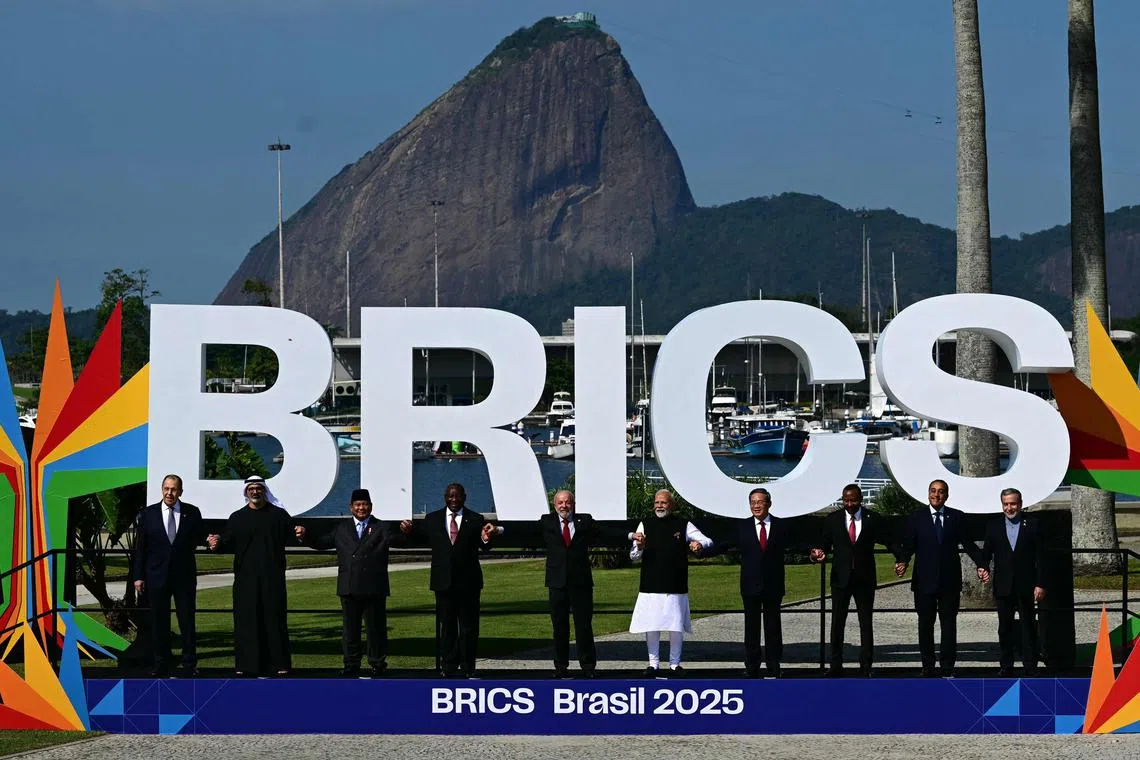Brics leaders condemn Gaza and Iran attacks, urge global reforms
Sign up now: Get ST's newsletters delivered to your inbox

Brazilian President Luiz Inacio Lula da Silva (right) and Chinese Premier Li Qiang ahead of the Brics summit in Brazil.
PHOTO: EPA
- Brics leaders at the July 6 summit condemned attacks on Iran, Gaza, and Kashmir, positioning the bloc as a defender of multilateral diplomacy against the US.
- The expanded Brics, now including Egypt, Ethiopia, Indonesia, Iran, Saudi Arabia and the UAE, aims to represent the Global South and update international governance.
- Brics supports initiatives like the Multilateral Guarantees and backs Ethiopia and Iran's WTO bid, while condemning rising tariffs and supporting climate initiatives.
AI generated
RIO DE JANEIRO, Brazil - Leaders of the Brics group of developing nations condemned attacks on Gaza and Iran, called for reforms of global institutions, and presented the bloc as a haven for multilateral diplomacy amid violent conflicts and trade wars.
With forums such as the Group of Seven and Group of 20 groups of major economies hamstrung by divisions and the disruptive “America First” approach of US President Donald Trump, expansion of the Brics has opened new space for diplomatic coordination.
In his opening remarks at the meeting in Rio de Janeiro, Brazilian President Luiz Inacio Lula da Silva drew a parallel with the Cold War’s Non-Aligned Movement, a group of developing nations that resisted joining either side of a polarised global order.
“Brics is the heir to the non-aligned movement,” Mr Lula told leaders. “With multilateralism under attack, our autonomy is in check once again.”
Brics nations now represent more than half the world’s population and 40 per cent of its economic output, Mr Lula noted in remarks on July 5 to business leaders warning of rising protectionism.
The original Brics group gathered leaders from Brazil, Russia, India and China at its first summit in 2009. The bloc later added South Africa and in 2024 included Egypt, Ethiopia, Indonesia, Iran, Saudi Arabia and the United Arab Emirates as members. This is the first summit of leaders to include Indonesia.
A Brazilian diplomat who asked not to be named said: “The vacuum left by others ends up being filled almost instantly by the Brics.” Although the G-7 still concentrates vast power, the diplomat added, “it doesn’t have the predominance it once did”.
However, there are questions about the shared goals of an increasingly heterogeneous Brics group, which has grown to include regional rivals along with major emerging economies.
Stealing some thunder from the 2025 summit, Chinese President Xi Jinping chose to send his premier in his place.
Russian President Vladimir Putin is attending online due to an arrest warrant
Still, several heads of state were gathered for discussions at Rio’s Museum of Modern Art on July 6 and 7, including Indian Prime Minister Narendra Modi and South African President Cyril Ramaphosa.
More than 30 nations have expressed interest in participating in the Brics, either as full members or partners.
Growing clout, complexity
Expansion of the Brics has added diplomatic weight to the gathering, which aspires to speak for developing nations across the Global South, strengthening calls for reforming global institutions
“If international governance does not reflect the new multipolar reality of the 21st century, it is up to Brics to help bring it up to date,” Mr Lula said in his remarks, which highlighted the failure of US-led wars in the Middle East.

(From left) Russian Foreign Minister Sergei Lavrov, UAE President Sheikh Mohamed bin Zayed al-Nahyan, Indonesian President Prabowo Subianto, South African President Cyril Ramaphosa, Brazilian President Luiz Inacio Lula da Silva, Indian Prime Minister Narendra Modi, Chinese Premier Li Qiang, Ethiopian Prime Minister Abiy Ahmed Ali, Egyptian Prime Minister Mostafa Madbouly and Iranian Foreign Minister Abbas Araghchi at the Brics summit in Brazil on July 6.
PHOTO: AFP
In a joint statement released on the afternoon of July 6, the leaders condemned military attacks against Iran’s “civilian infrastructure and peaceful nuclear facilities under full safeguards of the International Atomic Energy Agency”.
The group expressed “grave concern” for Palestinians over Israeli attacks in Gaza, and condemned what the joint statement called a “terrorist attack” in India-administered Kashmir.
On trade, the joint statement warned that the “indiscriminate rising in tariffs” threatens global trade, continuing the group’s veiled criticism of Mr Trump’s tariff policies.
The group also voiced its support for Ethiopia and Iran to join the World Trade Organisation, with a call to urgently restore its ability to resolve trade disputes.
The leaders’ joint statement backed plans to pilot a Brics Multilateral Guarantees initiative within the group’s New Development Bank to lower financing costs and boost investment in member states, as first reported by Reuters last week.
In a separate statement following a discussion on artificial intelligence, the leaders called for protections against the unauthorised use of AI to avoid excessive data collection and allow mechanisms for fair payment.
Brazil, which also hosts the UN climate summit in November, has seized on both gatherings to highlight how seriously developing nations are tackling climate change, while Mr Trump has slammed the brakes on US climate initiatives.
China and the UAE signalled in meetings with Brazilian Finance Minister Fernando Haddad in Rio that they plan to invest in a proposed Tropical Forests Forever Facility, according to two sources with knowledge of the discussions on funding conservation of endangered forests around the world. REUTERS


